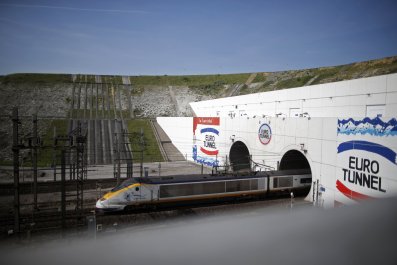It's a truism that Israelis say nasty things about themselves and their leaders that American politicians can never say, lest they rile up the U.S. pro-Israel lobby and see their campaign donations evaporate.
Take the "chickenshit" kerfuffle, the latest flap in the notoriously acrimonious relationship between President Obama and Israeli Prime Minister Benjamin Netanyahu. "The thing about Bibi," an anonymous senior Obama administration official was quoted saying the other day, using Netanyahu's nickname, "is he's a chickenshit."
That broke new ground in the name-calling game between Jerusalem and Washington, which had already hit historic lows after Israeli defense minister Moshe Ya'alon labeled Secretary of State John Kerry "obsessive" and "messianic" for pursuing a Palestinian peace deal. And that was just what'd he'd say in public.
Clearly, Obama officials are fed up with Netanyahu – whose government is slated to receive $3.4 billion in American aid in fiscal year 2014 – for making a bad situation worse by expanding Jewish settlements on Arab lands. New ones greenlighted in East Jerusalem have the country teetering on the edge of a third intifada.
"The good thing about Netanyahu," the official added, "is that he's scared to launch wars," meaning a unilateral attack on Iran. "The bad thing about him is that he won't do anything to reach an accommodation with the Palestinians or with the Sunni Arab states. The only thing he's interested in is protecting himself from political defeat. He's not [Yitzhak] Rabin, he's not [Ariel] Sharon, he's certainly no [Menachem] Begin," all of whom made deals with their sworn enemies. "He's got no guts," the official pronounced. Another anonymous official called Netanyahu "a coward."
The quotes exploded like fireworks over Washington and Jerusalem, burning all the brighter because of the cannister they came from, Atlantic Magazine correspondent Jeffrey Goldberg, one of Israel's most influential and sophisticated friends in America. Such remarks, Goldberg wrote, are "yet another sign that relations between the Obama and Netanyahu governments have moved toward a full-blown crisis."
But like so many issues between Israel and the United States, the "crisis" is likely to peter out, not only because the U.S.-Israeli relationship always weathers such periodic squabbles, but because so many ranking Israelis themselves throw the same epithets at Netanyahu, in public and private. He's used to it. He may love it, even if many of his critics say he is leading Israel off a cliff.
In his Jerusalem office last winter, for example, a retired general and top former Israeli defense ministry official told me that Netanyahu "understands intellectually" that he needs to negotiate a settlement with the Palestinians, "but I don't know if he has the guts."
I heard a half-dozen variations of "no guts" used by top former and current military officials to describe Bibi during my week in Israel last winter.
Ephraim Sneh, a tough former paratrooper and onetime governor of the Israeli-occupied West Bank, for example, complained that Netanyahu lacked the guts to expel religious extremists from his political coalition, a precondition for a final settlement with the Palestinians. "This coalition will bring an end to the Jewish state," Sneh told me in his high-rise office in Herzliya, where his broad windows offer a sweeping view of Israel's Silicon Valley. "That's why it has to be changed," he said. But to change, "BIbi would have to be a brave man." He would have to shed a lifetime political persona built on insulting and degrading the Palestinians, he said, much like President Richard Nixon risked his anti-communist base in 1972 by making peace with China.
But Netanyahu isn't that man, said Sneh, who participated in the famous IDF hostage-rescue commando raid on Uganda's Entebbe airport in 1976. "In order to do a Nixon going to China," he said, "you have to have a Nixon."
"Bibi doesn't have any balls," echoed Gilead Sher, another top former soldier and defense official, in his Tel Aviv office last February. A former tank brigade commander who worked on the Oslo peace negotiations under Prime Minister Yitzhak Rabin and was chief of staff to Prime Minister Ehud Barak, Sher called Netanyahu "very smart. He understands the situation." But he just can't break with the religious parties propelling the settlements. The Hamas rocket campaign, meanwhile, has only bolstered his hardline stance.
"Israel's international isolation deepens," Sher wrote in an op-ed last week, "and calls for boycotts increase, yet Prime Minister Benjamin Netanyahu offered no concrete diplomatic strategy at the United Nations last month, nor has he since."
Netanyahu's obstinacy enrages Obama administration officials, who look at the prime minister and see "a no-vision small-timer who worries mainly about pleasing the hardest core of his political constituency," according to Goldberg.
In doing so, Netanyahu risks fumbling what has traditionally been regarded by Israelis as the prime minister's most important job: managing Israel's relationship with the United States.
"The Israeli electorate always has judged their prime ministers on their stewardship of the Israel-U.S. relationship, and some prime ministers, like Yitzhak Shamir and Netanyahu after his first term, lost their positions because they were seen as having mishandled that relationship," said Jonathan Broder, Congressional Quarterly's senior editor for defense and foreign policy, who covered the Middle East from Israel for the Associated Press, NBC and The Chicago Tribune for many years. But Broder thinks this time Netanyahu may be playing a tune most Israelis like--no matter that it's a dead end.
"The personal enmity between Netanyahu and Obama has created its own political dynamic," Broder told Newsweek. "Many in the Israeli public share Netanyahu's distrust of Obama, so it's not so clear he will suffer politically for this bout of tension."
























